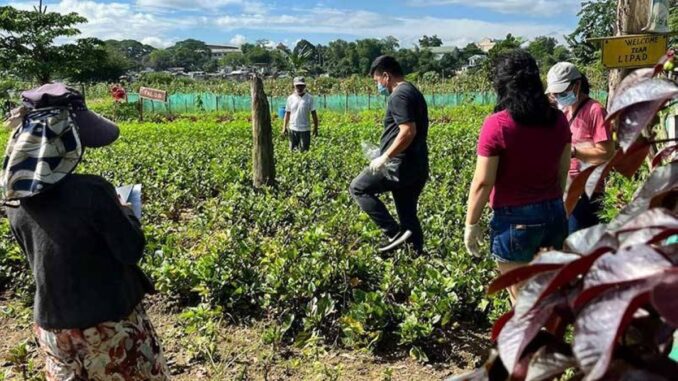
SCIENTISTS from the University of the Philippines-Diliman College of Science (UPD-CS), supported by the Department of Agriculture-Bureau of Agricultural Research (DA-BAR), are investigating the levels of Escherichia coli (E. coli) in vegetables grown in urban areas, which could help those engaged in urban agriculture improve their produce.
This, as a type of bacterium called Escherichia coli (E. coli), found in the feces of humans and animals, is often released into bodies of water such as streams. Although most E. coli strains are harmless, some can cause foodborne diseases such as gastroenteritis, typhoid fever and dysentery. Feces are a major source of microbial contamination in fresh produce. With the rise of urban farming in the Philippines during the Covid-19 pandemic, it is essential to monitor fresh produce from urban farms to recognize and address food safety issues immediately.
Researchers gather samples of mustasa or mustard greens at the New Greenland Farm in Bagong Silangan, Quezon City. CONTRIBUTED PHOTO
Pierangeli Vital, Donnabel Sena, Czarina Jay Catapat and Ma. Christine Jasmine Sabio from the UPD-CS Natural Sciences Research Institute, along with Windell Rivera of the UPD-CS Institute of Biology, gathered 419 vegetable samples from three urban farms and four major wet markets in Metro Manila. The group detected E. coli in 13.60 percent of all the samples. The presence of E.coli in the samples from urban farms was also higher than in the samples obtained from wet markets.
Vital said that high levels of E. coli in the samples from urban farms could be linked to various factors, such as lack of thorough postharvest processing, unlike the samples from wet markets. “As observed in the urban farm sampling sites, they frequently use rainwater, pond water and well water for irrigation, mainly for economic reasons, but this increases the risk of bacterial contamination,” she said.
Animals such as dogs, cats and chickens often roam around urban farms, which raises the risk of microbial contamination in the irrigation water and soil where the vegetables grow. The researchers considered these as areas for improvement in developing urban farming practices.
“This research, together with our past research on agricultural food safety, is and was used in creating and adopting Philippine National Standards on pre- and postharvest microbial food safety in agriculture, with initiatives spearheaded by the DA-Bureau of Agriculture and Fisheries Standards,” said Vital.
The researchers stated in their paper that the results could provide a factual basis for regulating, controlling and eliminating food pathogen contamination in fresh produce, thereby helping policymakers implement regulations that ensure food safety. Even so, Vital mentioned that preventing foodborne illnesses, such as E. coli, can also be done by Filipinos in their own homes.
“Proper handling and cooking must be practiced at home, which involves simple steps such as thoroughly washing hands and kitchenware as well as disinfecting table surfaces when preparing food, using clean water when washing vegetables, effectively separating cooked and raw foods, and storing food the right way,” Vital added. “Following these simple steps can significantly help reduce the risks of foodborne illness at home and in the community.”
They plan to include more surveillance of relevant foodborne pathogens and conduct the study on a national level, in addition to investigating the antimicrobial resistance of the bacteria. These endeavors will provide significant data for analyzing trends in microbial food safety in the Philippines.
The paper, titled “Thermotolerant Escherichia coli contamination in vegetables from selected urban farms and wet markets in metro Manila, Philippines at the height of Covid-19 pandemic,” was published in the Asia-Pacific Journal of Science and Technology, a peer-reviewed journal covering research fields such as engineering, agricultural sciences, technology and health sciences.


Be the first to comment